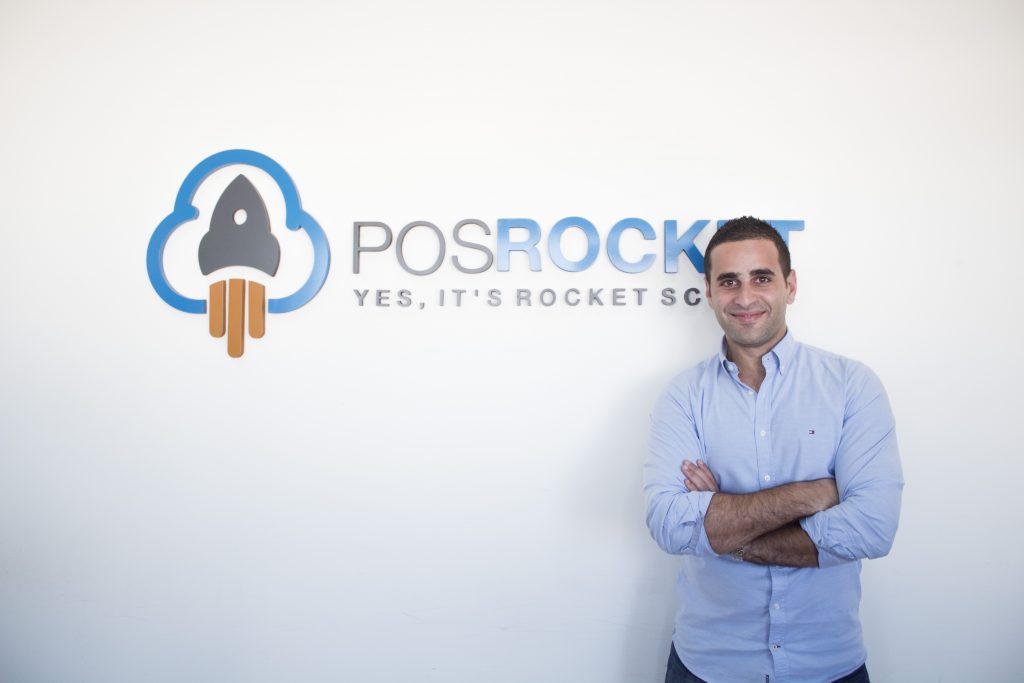Last August, I had the chance to spend some time in the Middle East. Between getting some well deserved R&R, and learning more about how the refugee crisis is still affecting millions of people around the world, I took part in several events in Jordan focused on entrepreneurship.
In one of them, I met Zeid Husban, a prolific entrepreneur who gained notoriety in Jordan with the creation of his first venture, the online food ordering platform ifood.jo. Though he sold it after four years of hard work, it didn’t stop his entrepreneurial spirit at all. In fact, he began his next venture, POSRocket around the time his ifood.jo venture was coming for a close.
Zeid is the first 110% Entrepreneur I’ve had in this series of 10% profiles, and his story is fascinating. Besides managing POSRocket, he’s also part of the Entrepreneurship Council of the government of Jordan, which helps create the conditions to keep the country’s entrepreneurial movement growing.
1. What are the names of your businesses and what do you do? When did you start it?
ifood.jo & POSRocket. I started ifood in 2012, which is an online food ordering platform. I sold the company in 2016 and started POSRocket, a cloud point of sale platform.
2. What’s the story behind ifood.jo?
I always wanted to start my own business, but was waiting for the right opportunity. I took a course called mini MBA with a school friend, and we were talking about starting a new business together. So, we started exchanging ideas and he had already started a similar business to ifood in Canada where he did his bachelors degree, and had to close it down due to cash flow issues. So, we decided to reinvent the wheel in Jordan.
We had no investment whatsoever. I used to work a FT job in a company called Vision Engineering Group as a technical support manager and used to DJ on weekends. We started with ifood.jo and we stayed at my partner’s garage for 18 months due to limited finances. I did not quit my job for the first 6 months because I used to take my salary and split it between me and my partner to support the business. When we started to generate a bit of revenue, I did quit my job and joined full time with ifood.
We managed to grow the company because we were on top of our business 24/7 and we had passion, which kept us going and never giving up with the limited resources we had.
After 2 years of operations, we caught the eyes of investors from the region and we were able to eliminate 3 other players in the market. We sold a majority stake in 2014 and then sold the rest of our shares in 2016.
3. When ifood.jo began catching the eye of investors, how did you manage that process? What factors did you keep in mind while evaluating potential partners?
We always had offers from investors who were not in the field and no had added value. We decided to wait for the right investor to come with added value not just money. We partnered up with a company called Yemeksepeti. They are in the same field and been in the market for 12 years. They brought tremendous value to our company as we moved our entire IT department to Turkey. They shared all their expertise with us, which really helped grow the business.
4. What made you decide to sell the company?
We decided to sell the company because we knew the growth potential for ifood was only possible Jordan, and Jordan is a very small market. So, we wanted something that can be scaled to the MENA region, and we made sure our “baby” is in good hands because whoever bought the company works in the same field.
5. During the sale of ifood.jo, you started POSRocket. What inspired you to do it?
I knew I was going to exit ifood late 2015 with 8 months to handover the company to the new owners. Therefore, I started thinking on what I could do next. I wanted to stay in the same field - technology - and by working in the same sector (F&B) for almost 5 years, I had good connections and I wanted to leverage my network.
I looked at the POS industry in Jordan and the region, which was definitely outdated. Compared to the cloud technology in the POS industry in the States and Europe, where it has been there for the past 8-9 years, it is gaining huge market share due to its flexibility.
Then, I started researching the space and I read a lot of articles. I even flew to Cairo for 1 week to scout the market and talk to business owners over there. I chose Egypt because there is a huge market cap and very controlled risk due to the low salary scheme over there.
Finally, I partnered up with a technical accelerator here in Jordan and we hired the first three engineers to start developing the product. So, we wrote the first line of code in April 2016 while I was still at ifood handing over the company. We had our first MVP installed in June at a restaurant in Amman. Then we tested the product for 2 months and my last day at ifood, which was July 31st, was also my first day at POSRocket.
I had the office and team ready, and less than a month later, we had our first paying client. Then we opened our offices in Egypt in December 2016 and we have been expanding since then. Right now, we have more than 130 clients so far, processed over $7 million in sales and more than 700k worth of transactions.

6. Even though both startups have different core businesses, how do they fit within your life and who you are?
The core is different but it is within the same industry - tech , restaurants, retail - and I do learn something new every single day. I like new challenges. I don’t like to keep doing the same thing for a very long time. Facing new challenges keeps me motivated.
7. In what ways does POSRocket play to your strengths – i.e. past business or education experience or network of contacts?
In my previous startup I worked with restaurants for almost 5 years and we really helped them generate extra revenues by bringing new business. So, we built this trust between us and our clients. This really helped me with my current startup as I am leveraging this great network.
8. Do you consider yourself a 110% Entrepreneur? Why?
I think I am. I managed to start ifood with a partner while I was still at my full time job. Then I started POSRocket and got it operational while I was still handing over ifood.
9. Do you have any partners? What do they bring to the table that you do not? Are they also 10%?
Yes, I do have a partner who already runs another development company and he really helped me with setting up the business technically. He is very solid and he accelerated the technical process by 110%
10. What has been the biggest challenge and how have you overcome it?
Our biggest challenge is finding the right talent given that at this stage since we can't compete with the high salary scale. We managed to overcome this issue by offering employees a stock option pool for key team members and it is working well so far.

11. What are your top tips for managing time?
My advice is to get into a routine. Working out in the morning, then working till 6-7, then I have to see my family and daughter. Every start is hard and time consuming so you need to find the balance between work and personal life.
12. Who have you gone to for advice and what do you do when you need help?
I have a few mentors that I always talk to, and now I just recently joined the Endeavor network. Ihoping to get more advice and help from their outstanding network.
13. Besides your own ventures, you also take part on the Entrepreneurship Council of the government of Jordan. What’s your role in the council? How has the experience been?
This council was recently formed and my role in it is to help the government execute the reach 2025 vision by digitizing the economy. I was selected with 2 other fellow entrepreneurs, as they wanted a new / young blood.




